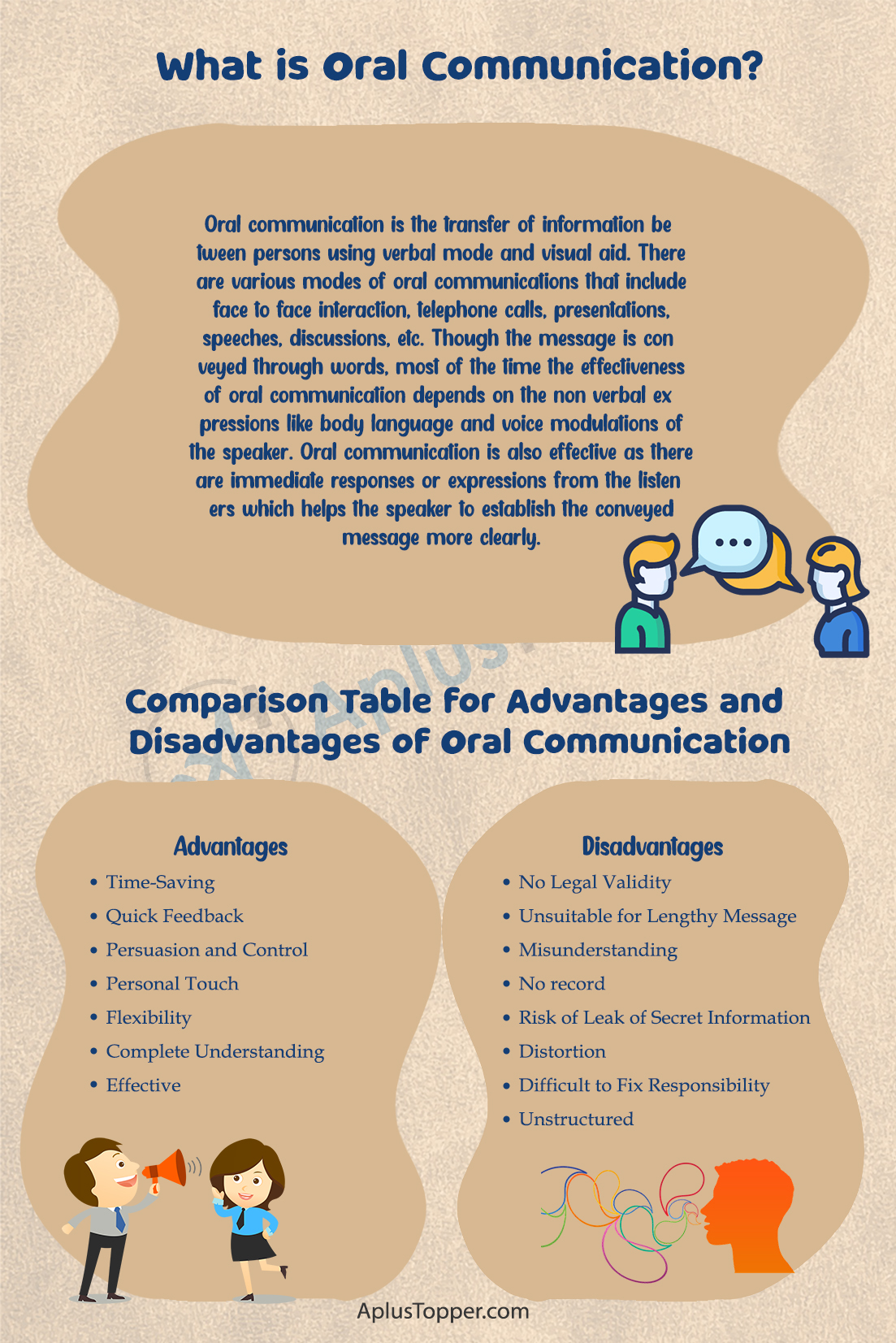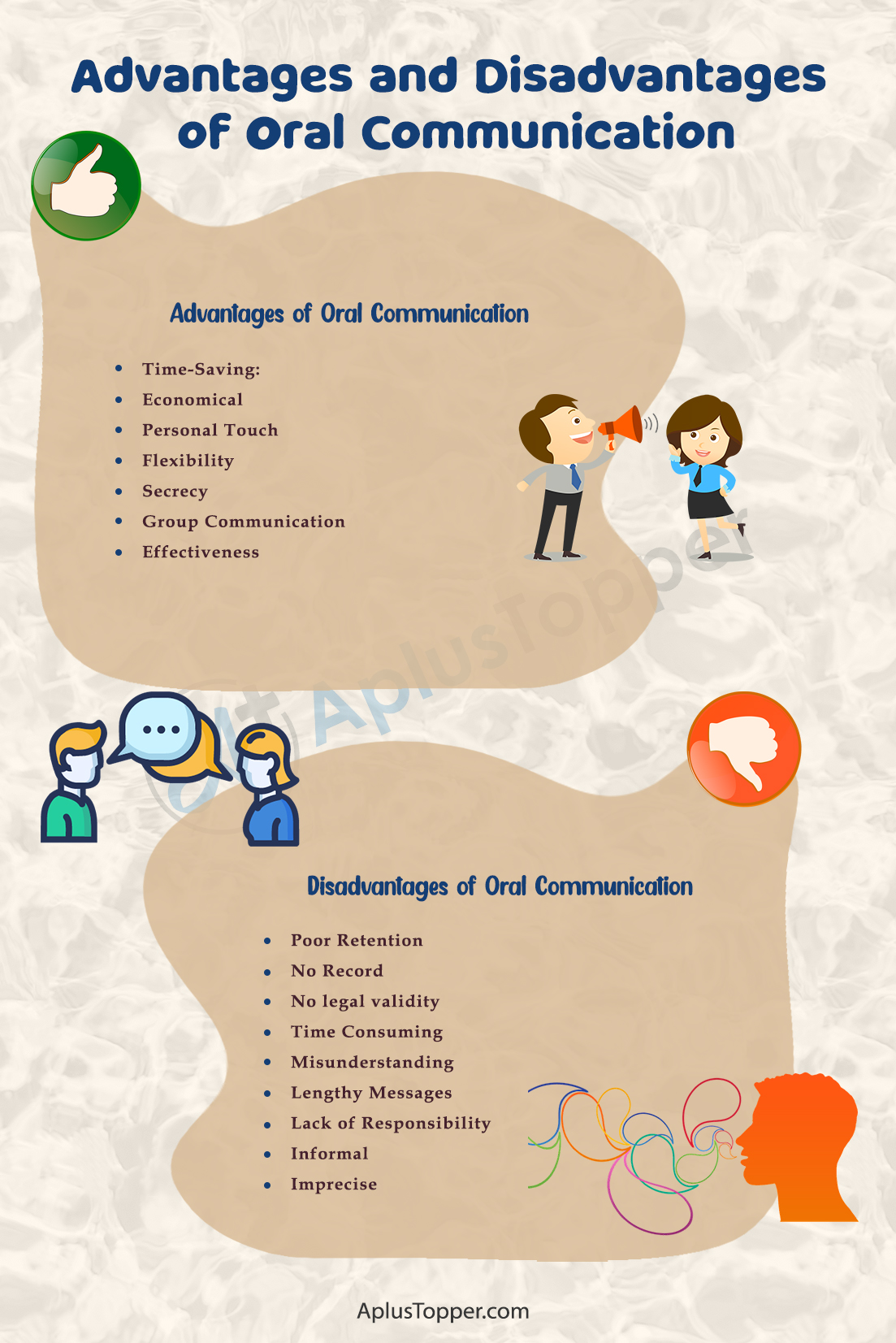Oral Communication Advantages And Disadvantages: Communication is an important factor for our social and professional identity. Communication is interlinked with one’s personality. Anyone can express his point of view through it. Individuals feel secure when conveying their thoughts, feelings, and opinions to other people effectively through communication, whether oral or written. Communication is a two-way method that is used to exchange information and ideas between different individuals through the application of some commonly used modes.
Communication is an essential constituent for society to function by successful interaction with each other. Oral or verbal communication is more prevalent in today’s daily lives, although it is taken as an informal way of communication. Oral communication is more effective in delivering the message to the target listeners with clarity of expression. Types of verbal communications include interpersonal, small group, or public communications depending on the number of listeners involved.
Students can also find more Advantages and Disadvantages articles on events, persons, sports, technology, and many more.
What is Oral Communication? Advantages and Disadvantages of Oral Communication 2022
Oral communication is the transfer of information between persons using verbal mode and visual aid. There are various modes of oral communications that include face-to-face interaction, telephone calls, presentations, speeches, discussions, etc. Though the message is conveyed through words, most of the time the effectiveness of oral communication depends on the non-verbal expressions like body language and voice modulations of the speaker. Oral communication is also effective as there are immediate responses or expressions from the listeners which helps the speaker to establish the conveyed message more clearly.
- Advantages of Oral Communication
- Disadvantages of oral communication
- Comparison Table for Advantages and Disadvantages of Oral Communication
- FAQ’s on Oral Communication Advantages And Disadvantages
Advantages of Oral Communication
Immediate Feedback: It can provide immediate feedback to both the parties engaged in communication. The speaker can immediately feel the reaction of the listener or audience. The listeners also get clues about how their response is being perceived by the speaker.
- Time-Saving: This type of communication is very fast. It saves the time involved in writing and delivering messages.
- Economical: It saves the cost for stationeries and other costs related to the non-verbal channel of communication.
- Personal Touch: Verbal communication helps to build up a healthy environment during face-to-face interaction.
- Flexibility: This type of communication allows the speaker to influence the audience by his voice, tone, expressions, and body language. The speaker can also adjust his communication pattern after getting suitable feedback from listeners.
- Secrecy: Oral messages can be easily kept confidential than written messages when only two individuals are present.
- Group Communication: This is the most effective way to communicate with a group in meetings, conferences, or classroom teaching.
- Effectiveness: Oral communication involves the actual presence of the parties thereby ensuring the effective transfer of messages in the way intended. This helps to achieve the goal of communication effectively.

Disadvantages of Oral Communication
- Poor Retention: The listener may not retain the verbal messages in his memory for a long time. Even the speaker sometimes may not recall what he said.
- No Record: Usually, no record is maintained for oral communication to be used for future reference.
- No legal validity: Oral messages have no legal validity in the absence of any record.
- Time Consuming: Non-verbal communication generally consumes more time because there is no specific written message or a note with a definite end. This can continue for a long time till any satisfactory conclusion.
- Misunderstanding: The messages conveyed non-verbally may be misinterpreted due to various factors such as poor expression and lack of clarity from the speaker. Also, the listener may be inattentive or unable to provide feedback.
- Lengthy Messages: Oral communication is not suitable for delivering lengthy messages as the audience may lose attention to some portions of the message that may be considered vital by the speaker to communicate.
- Lack of Responsibility: There is no documentation for oral messages so a person can’t be held responsible for saying something false, inaccurate, or wrongly intended.
- Informal: Oral communications are often considered informal or casual, whereas written communication is a formal way to communicate and is given more importance by certain people.
- Imprecise: People sometimes tend to lose focus on the relevant topic when speaking, which can be avoidable in writing communication.
Comparison Table for Advantages and Disadvantages of Oral Communication
| Advantages | Disadvantages |
| Time-Saving: Oral communication is the best method when immediate action is required. A message over the phone or giving oral instructions personally to someone can help to expedite work and save valuable time. | No Legal Validity: Oral messages don’t have any legal validity unless they are recorded or documented |
| Quick Feedback: Oral communication produces quick feedback from the receiver. The receiver and the sender both can adjust the communication accordingly depending on the response and the communication becomes more effective. | Unsuitable for Lengthy Message: Oral communication is not suitable for exchanging lengthy messages because of the chance of missing some vital points. |
| Effective for all: Oral communication is suitable for mostly all types of people whether literate or illiterate and doesn’t depend on the access of instruments, stationeries, or devices. | Misunderstanding: Oral communication may lead to misunderstanding if the opportunity of giving and receiving feedback is not available. This can be possible when the parties are not serious enough about the outcome of communication. |
| Persuasion and Control: Speeches through oral communication are a powerful means of persuasion and control. Team leaders can motivate the team members by verbal messages using a face-to-face conversation that gives a successful outcome. | No record: The meaning of the oral message may create confusion in absence of any record or documentation for future reference. |
| Personal Touch: Interaction through verbal communication builds a sense of personal feelings whereas written communication is mostly considered as a formal method of communication. In oral communication, the speakers can express their feelings more clearly that makes the message more impactful. | Risk of Leak of Secret Information: In oral communication, there is a greater risk of leak of some secret information due to negligence of the parties involved in communication. |
| Flexibility: Oral communication has the flexibility of changing the content or focus as required at any time during the conversation, to convey messages properly to target audience. | Distortion: Sometimes, due to mannerism or improper pronunciation, the oral communication lacks clarity and listeners may fail to understand the meaning of a message. |
| Complete Understanding: In the case of oral communication, the receiver can seek a better explanation of the message by the sender. Using the immediate feedback opportunity, both parties can better understand how the message is to be exchanged. | Difficult to Fix Responsibility: In oral communication, it is difficult to specifically assign responsibility to anybody for any false or wrong information as there is no record. |
| Effective: Oral communications are considered to be more effective due to the actual presence of listeners that ensures delivery of messages to the concerned people. | Unstructured: Oral communication may sometimes become imprecise due to unstructured format and speakers may lose focus from the main point while communicating. |

FAQ’s on Oral Communication Advantages And Disadvantages
Question 1.
Does oral communication have any legal validity?
Answer:
Oral communication has no legal validity in absence of any record or documentation.
Question 2.
In which sense oral communication is more flexible than written communication?
Answer:
In oral communication, the speaker can adjust his expression and body language depending on the response received, to make the communication more effective.
Question 3.
How oral communication helps in persuasion and motivation?
Answer:
Oral communication has more impact on listeners due to direct interaction and conveying vibes of positivity and encouragement.
